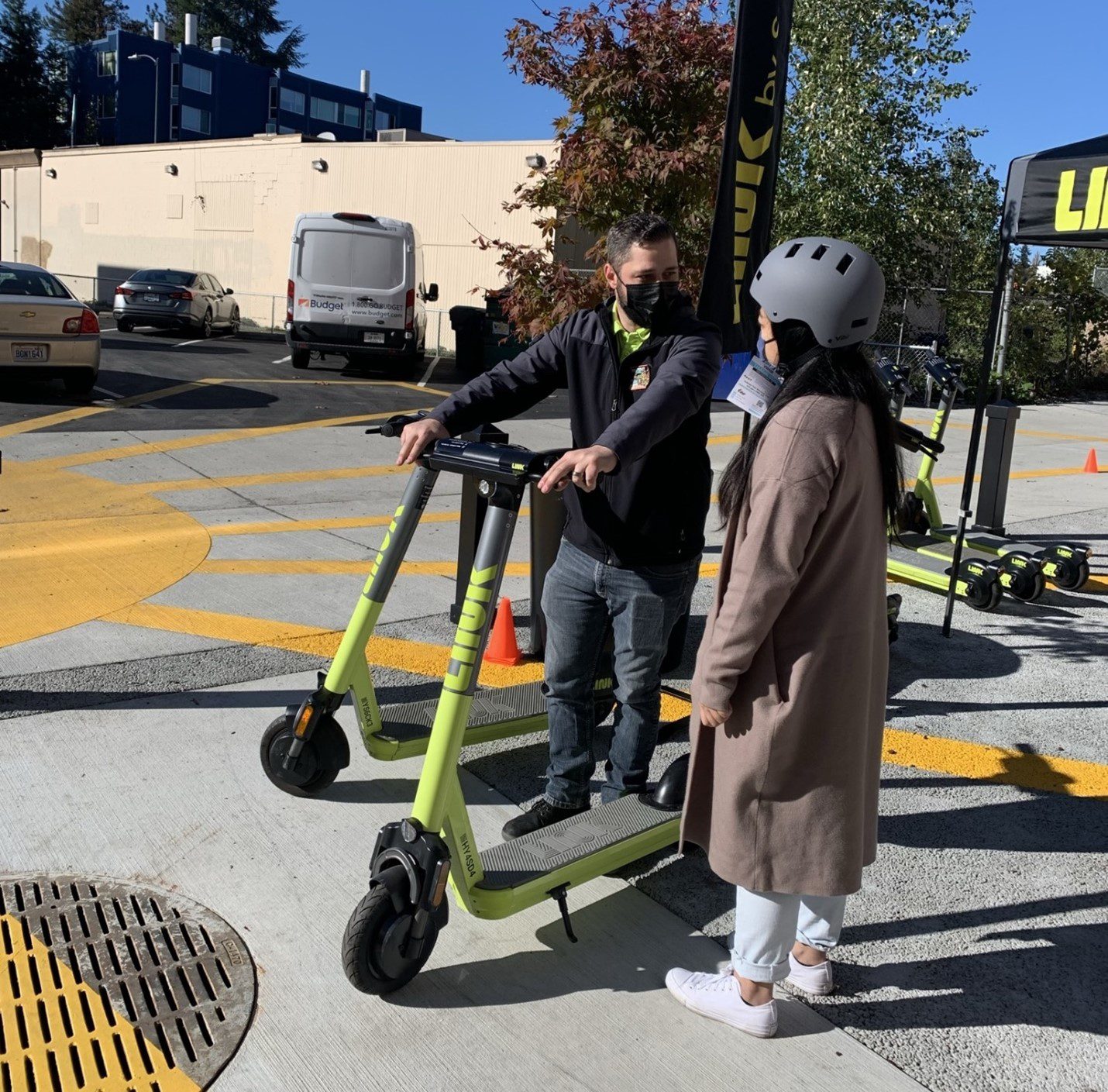 A Seattle scooter outreach event in fall 2021. Photo credit: SDOT
A Seattle scooter outreach event in fall 2021. Photo credit: SDOT Seattle’s scooter share program gives residents and visitors another option to get around the city without a car. Last month, we concluded the program’s pilot phase. We shared the next steps in a blog post, which included conducting a competitive application process to choose the next set of scooter share companies approved to operate in Seattle. We asked each scooter company that applied to provide a detailed strategy for how they’d address safety, equity, and improper parking, so we could evaluate them side-by-side and select the strongest applicants.
After careful review, we selected three scooter companies to receive operation permits for 2022–2023: Lime, LINK (by Superpedestrian), and Bird. In addition to scooters, riders continue to have the option of renting shared bicycles from Lime and Veo.
In addition to welcoming back Lime and LINK (by Superpedestrian), we are excited to welcome Bird. Bird operates in over 400 cities and has a demonstrated commitment to safety and sustainability. They will bring their newest third generation of scooters to Seattle, which offers a safer ride and longer battery life than their earlier models.
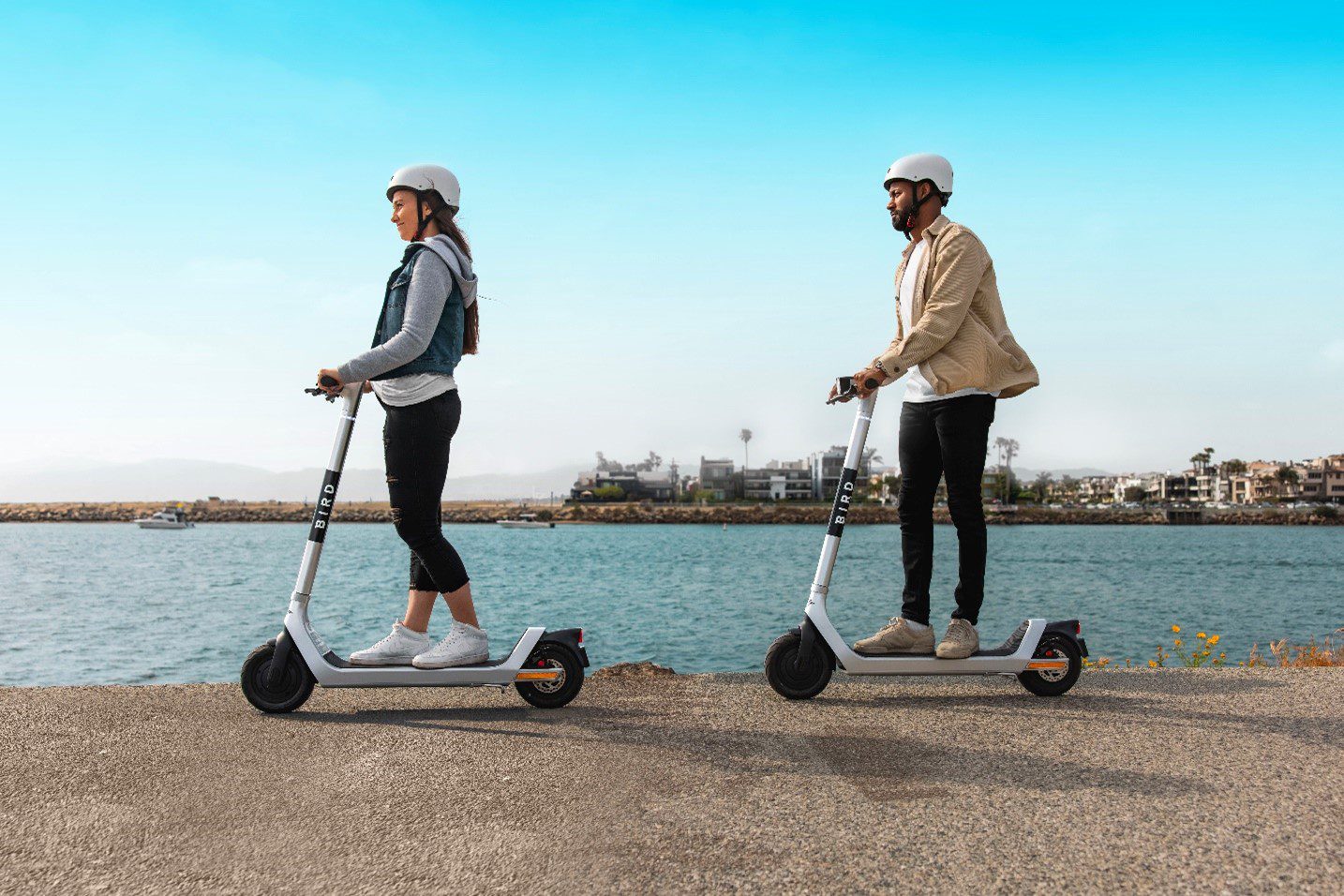
How we selected the three scooter companies with the best strategy to address city priorities, including safety, equity, access, and sustainability.
All three of the selected companies submitted robust proposals detailing their commitment to safety, community engagement, and continual improvement, as well as considering the needs of other people traveling on streets, sidewalks, bike paths, and trails.
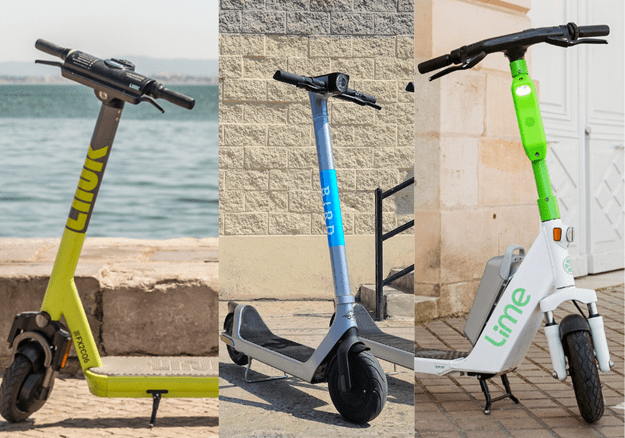
The selection was difficult, and we are grateful for Wheels and Spin, two current scooter companies that will not continue operating in Seattle, for the transportation service they provided between 2020–2022.
We are issuing three permits at this time. We may issue an additional permit to another company in the future if we see a good opportunity to benefit the public.
There will continue to be a variety of types of scooters and bikes to choose from in Seattle. Lime will continue to offer pedal-assist electric bicycles in addition to scooters. Veo continues to offer their Cosmo electric bicycles, which feature a throttle so you can bicycle without pedaling. Later this year, LINK (by Superpedestrian) will begin offering seated-style scooters in addition to the standing scooters which are already in Seattle.
The new scooter share permits will be issued this month and last for one year. We plan to review the scooter share permits on an annual basis. We expect it will take Bird a few weeks to begin operations and are looking forward to their announcement of a specific start date soon. The two companies departing Seattle will have a few weeks to wind down their operations and transfer their fleet to other cities.
Like with the previous set of permits, each company can deploy up to 2,000 scooters. Over the past year and a half, we’ve seen that the actual number of scooters deployed on Seattle streets has been lower than the maximum allowed. This interactive chart provides data about fleet size, ridership, and other statistics for our scooter, bike, and car share programs.
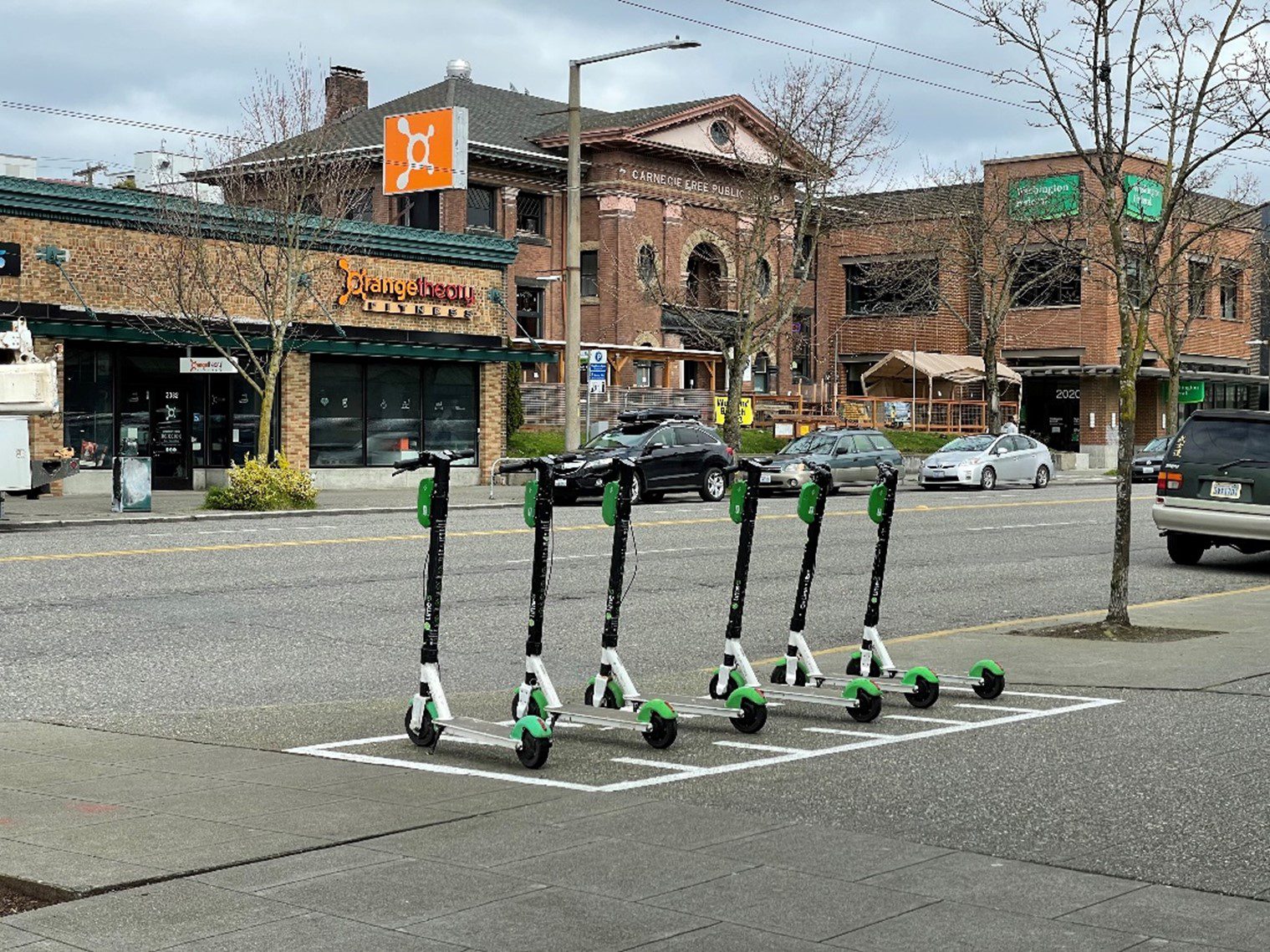
Scooter share program highlights at-a-glance:
- Seattle’s scooter share program was launched in September 2020 to provide another flexible, sustainable (low-carbon emission) transportation option.
- Last month, we published an evaluation report of the first year of the scooter share program.
- The report confirmed that scooters are popular – with over 250,000 people taking nearly 1.5 million scooter rides in the first year – and also illuminated some of the operational challenges which we are working to overcome to improve safety.
- We remain committed to Seattle’s Vision Zero goal of ending traffic deaths and serious injuries on city streets by 2030. Addressing the safety of people riding scooters is one of many parts of achieving that goal.
Each company submitted a detailed safety plan listing innovative ideas to improve the scooter share program.
Safety continues to be a top priority for the scooter share program and was the most important, central aspect of our selection process. Here are a few of the safety features and tactics the three chosen companies have committed to:
- Continuing proven safety tactics: Since the start of the scooter program, we have implemented various safety features and tactics, including riders taking a safety quiz before their first ride and a built-in speed limit cap of 8 mph on the first ride. All of these will continue, in addition to the improvements suggested by the successful applicants.
- Sturdier and stronger equipment: All three companies are offering more robust and safer scooter designs than earlier generations used in many U.S. cities over the past several years. This includes features like larger shock-absorbent wheels, superior suspension systems, internal brake housing, and repositioned batteries to create a lower center of gravity. These improvements help lead to a smoother and more stable ride, which is better able to navigate bumps in the road.
- Helmet distribution programs: All three companies provided detailed plans to give away free helmets to riders, as well as a new program offering discounts and incentives to riders wearing a helmet (see below). This is important because our recent scooter program evaluation survey found that 70% of respondents never or rarely wore a helmet, and 40% of respondents said that this was because they did not own a helmet (this was especially common for people under 25-years-old).
Get a free helmet!
- Scooter and bike share companies give away free helmets at community events like this East African Community Services bike giveaway event last summer, and also offer discounted helmets online and at local businesses.
- The scooter companies gave away hundreds of free helmets to Seattle riders last year, and all have plans to organize more free helmet give-away events in the future.
- Here are a few of the upcoming summer events where scooter companies are planning to give out free helmets: Duwamish River Festival, Peace Peloton Columbia City Night Market, Downtown Summer Sounds concerts, Capitol Hill Block Party, Day In Day Out Fest, and many more.
In addition to requiring the scooter companies to develop safety plans for riders, we also have plans at SDOT to design a safe system that enhances public health. This means building a bicycle network for all ages and abilities, lowering driving speeds so we can reduce the frequency and severity of crashes, and developing educational safety campaigns. These safety enhancements help everyone, including people riding scooters.
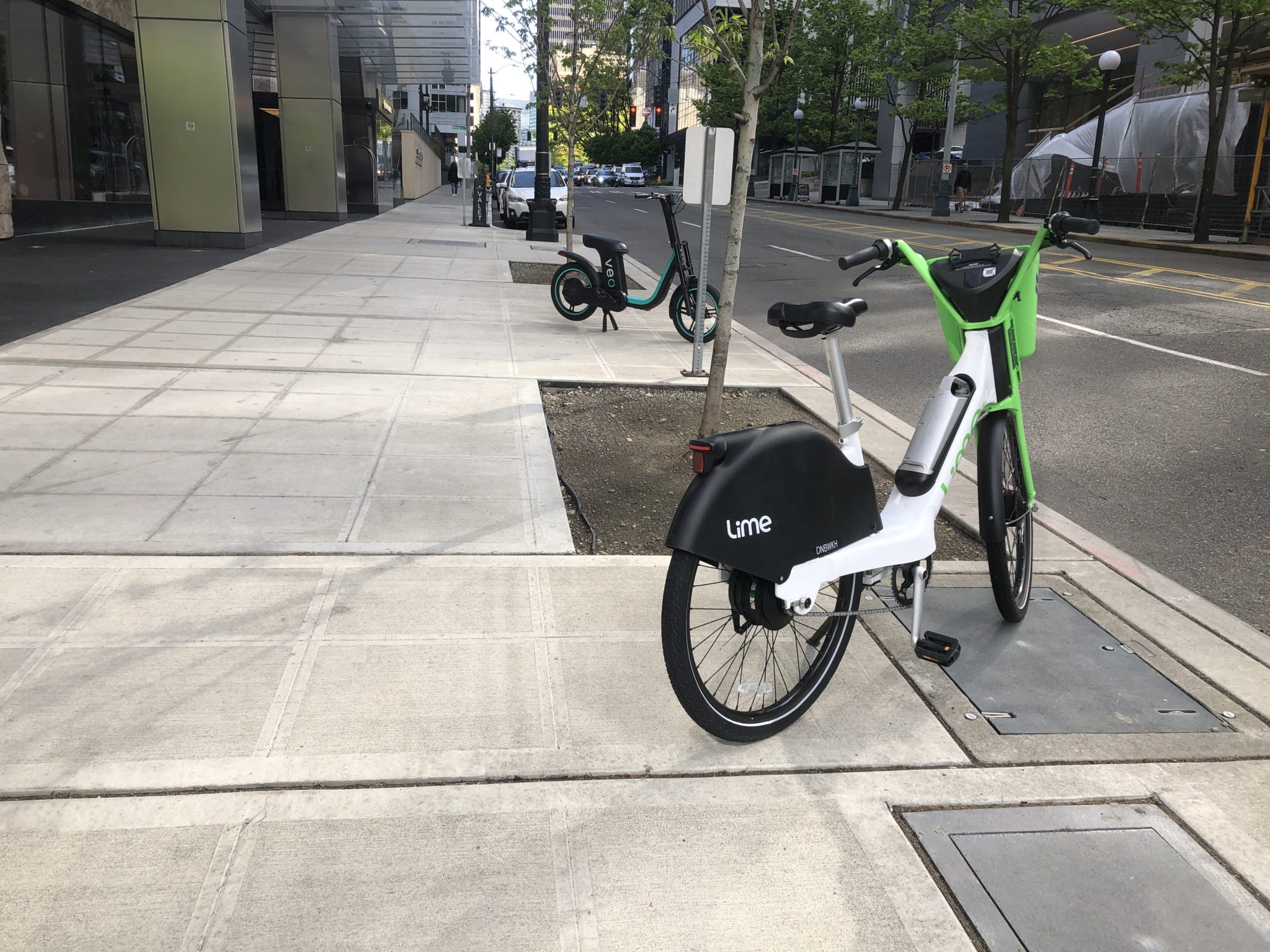
The companies also provided plans to address other operational challenges, including parking, equity, and sustainability:
- Use technology to enforce good parking: Each company has improved operating and device technology. For example, all three will implement GPS and intelligent sensor technology to help prevent riders from being on streets where they are not allowed for safety reasons and encourage less riding on sidewalks. This is a helpful tool for educating riders on parking rules and preventing people from ending their trip by leaving a scooter where it’s not supposed to be. To learn more about how to safely park scooters, please visit our website or watch this short video produced in partnership with Rooted in Rights.
- Improve batteries: The companies use batteries that last longer and can be quickly swapped out on the street. This means that customers will have an easier time finding a fully-charged scooter when they need it and makes the program more sustainable because scooters won’t need to be transported back to their base to be recharged as often.
- Continue commitment to equity: All three companies have committed to equity goals to distribute scooters in diverse neighborhoods throughout Seattle. Each company has also committed to offering a reduced-price program for people with low incomes. You can sign up on Lime’s, LINK’s (by Superpedestrian), and Bird’s websites.